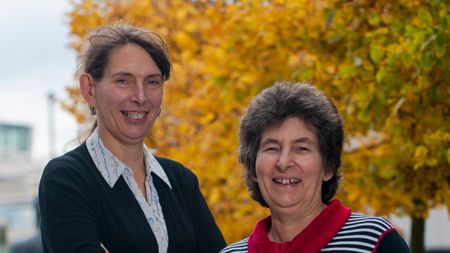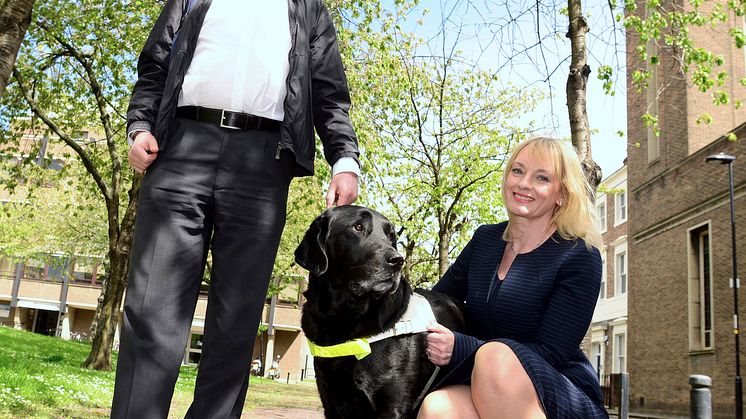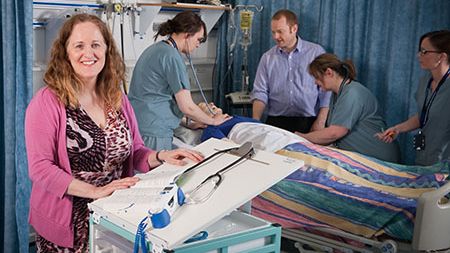
Press release -
Research to explore links between mentoring and doctors’ wellbeing
A new research project looking at how mentoring may lead to improvements in doctors’ health and wellbeing has received a prestigious grant from the British Medical Association.
The £55,000 three-year project is being led by Northumbria University in collaboration with Newcastle University Medical School, the Association of Anaesthetists of Great Britain and Ireland and the Newcastle Hospitals NHS Foundation Trust. It aims to understand the links between mentoring and doctors’ wellbeing.
Mentoring is not standard practice across the sector, despite a range of evidence of its benefits and General Medical Council guidelines which state that all doctors should be willing to take part in mentoring. The GMC says that experienced doctors should be prepared to mentor junior doctors and other health professionals; and that mentoring may be particularly important in the first years of practice, or when roles change throughout a doctor’s career.
The project team are keen to understand relationship between the Egan’s Skilled Helper model of mentoring and the professional and personal wellbeing of doctors.
The study will assess existing evidence of the benefits of mentoring and will see researchers work with up to 100 doctors with over two years’ experience of mentoring to gather examples and illustrations of the benefits it has brought.
Throughout the study the team will also track up to 15 doctors who have recently trained as mentors to collect information regarding mentoring activities and experiences, and examples of impact.
Dr Alison Steven, a Reader in Health Professions Education at Northumbria University, who is leading the project, said: “The health and wellbeing of doctors is crucial both for the individuals themselves, as well as their ability to deliver optimum patient care, yet there is a misconception that mentoring is for those experiencing difficulties. From my previous research this is certainly not the case.
“Mentoring seems to empower the mentee to unpick issues and develop plans, and learning to be a mentor helps doctors revisit specific communications skills such as listening and giving feedback. In particular, the Egan mentoring model seems to create a more supportive working environment, where concerns can be raised and where personal wellbeing may be improved due to being able to work through issues, dilemmas and opportunities.
“We believe the findings could have a lot of crossover within the health professions and could be of benefit to nurses and therapists, for example.”
Dr Nancy Redfern, a Consultant Anaesthetist at Newcastle Hospitals NHS Foundation Trust, said: “Mentoring is a very useful way of managing dilemmas and opportunities at work. A mentor might challenge assumptions or be a sounding board with whom one can discuss new ideas.
“Those of us who have worked with trained mentors have a wealth of personal experience of the value of such relationships, whether in building a team, organising our work or handling a difficult situation more elegantly.
“This grant provides an excellent opportunity to understand how individuals use ‘mentoring skills’ in their everyday work with patients and colleagues and in their own career development.”
The British Medical Association awards approximately ten research grants worth a total of £500,000 each year to encourage and further medical research. The project team have been awarded the Joan Dawkins grant, which was bequeathed to assist research into doctors’ health and wellbeing.
Dr Steven added: “As the British Medical Association only awards around ten research grants each year, this is an incredibly prestigious recognition of the impact our work could have, and we feel very honoured indeed.”
The project team also comprises Dr Val Larkin, a Senior Lecturer in Public Health and Wellbeing at Northumbria University and Dr Jane Stewart, Associate Dean for Taught Programmes at Newcastle University Medical School.
The award will be formally presented to Dr Steven by Baroness Ilora Finlay of Llandaff at a ceremony in London on 11 November.
Topics
Categories
Northumbria is a research-rich, business-focussed, professional university with a global reputation for academic excellence. To find out more about our courses go towww.northumbria.ac.uk
If you have a media enquiry please contact our Media and Communications team at media.communications@northumbria.ac.uk or call 0191 227 4571.








